 By Alaa Shahine, BEIRUT (Reuters) – Lebanon’s rival politicians met on Thursday for their broadest gathering since the 1975-90 civil war to tackle a political crisis over the role of Syria and its Lebanese allies that has paralyzed the government. The fate of President Emile Lahoud, who is under growing pressure to resign, will be among the most divisive issues on the table at so-called national dialogue talks that are expected to last up to a week.
By Alaa Shahine, BEIRUT (Reuters) – Lebanon’s rival politicians met on Thursday for their broadest gathering since the 1975-90 civil war to tackle a political crisis over the role of Syria and its Lebanese allies that has paralyzed the government. The fate of President Emile Lahoud, who is under growing pressure to resign, will be among the most divisive issues on the table at so-called national dialogue talks that are expected to last up to a week.
Also on the agenda is a U.N. resolution demanding Lebanon’s Hizbollah to disarm — a perennially thorny issue among those Lebanese who believe the Shi’ite group should stick to politics and those who see it as resistance against Israel. While not attending himself, Lahoud welcomed the talks but warned in the strongest terms against foreign pressure to disarm Hizbollah, highlighting just how split the country is."Calls by foreign powers to disarm the resistance would only serve Israel’s interests and weaken Lebanon," Lahoud said in a statement. "Any attempt on their part to disarm the resistance by force would certainly lead to another civil war." TO VIEW MORE PICTURES PLS CLICK "READ MORE"
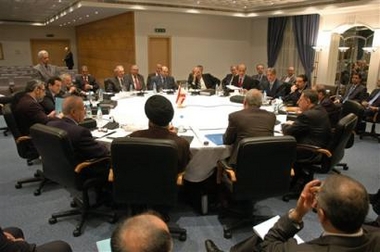
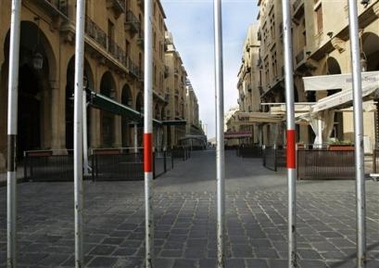 The downtown district of Beirut, where the parliament house is situated, is seen deserted through security barriers, after restaurants, sidewalk cafes, banks and businesses were ordered to close ahead of the Lebanese leaders’ meeting aimed to tackle the country’s worst political crisis since the end of the 1975-90 civil war, in Beirut, Lebanon, Thursday, March 2, 2006. Lebanon‘s rival leaders sat down together in an unprecedented political dialogue Thursday aimed at resolving the country’s deep divisions since the end of Syrian domination, amid warnings that failure could worsen the slide toward instability. (AP Photo/Hussein Malla)
The downtown district of Beirut, where the parliament house is situated, is seen deserted through security barriers, after restaurants, sidewalk cafes, banks and businesses were ordered to close ahead of the Lebanese leaders’ meeting aimed to tackle the country’s worst political crisis since the end of the 1975-90 civil war, in Beirut, Lebanon, Thursday, March 2, 2006. Lebanon‘s rival leaders sat down together in an unprecedented political dialogue Thursday aimed at resolving the country’s deep divisions since the end of Syrian domination, amid warnings that failure could worsen the slide toward instability. (AP Photo/Hussein Malla)
 General legislator MP Michel Aoun, right, escorted by Lebanese army soldiers, leaves the parliament house after he attended a Lebanese leaders’ meeting to tackle the country’s worst political crisis since the end of the 1975-90 civil war, in Beirut, Lebanon, Thursday, March 2, 2006. Lebanon‘s rival leaders sat down together in an unprecedented political dialogue Thursday aimed at resolving the country’s deep divisions since the end of Syrian domination, amid warnings that failure could worsen the slide toward instability. (AP Photo/Mahmoud Tawil)
General legislator MP Michel Aoun, right, escorted by Lebanese army soldiers, leaves the parliament house after he attended a Lebanese leaders’ meeting to tackle the country’s worst political crisis since the end of the 1975-90 civil war, in Beirut, Lebanon, Thursday, March 2, 2006. Lebanon‘s rival leaders sat down together in an unprecedented political dialogue Thursday aimed at resolving the country’s deep divisions since the end of Syrian domination, amid warnings that failure could worsen the slide toward instability. (AP Photo/Mahmoud Tawil)
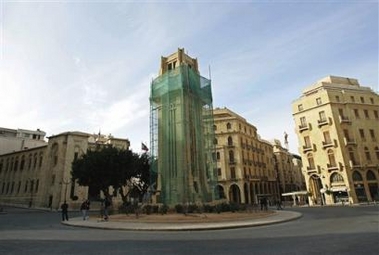 Journalists stand in front of the parliament house, left, in the empty downtown district of Beirut after restaurants, sidewalk cafes, banks and businesses were ordered to close ahead of the Lebanese leaders’ meeting aimed to tackle the country’s worst political crisis since the end of the 1975-90 civil war, in Beirut, Lebanon, Thursday, March 2, 2006. Lebanon‘s rival leaders sat down together in an unprecedented political dialogue Thursday aimed at resolving the country’s deep divisions since the end of Syrian domination, amid warnings that failure could worsen the slide toward instability. (AP Photo/Hussein Malla)
Journalists stand in front of the parliament house, left, in the empty downtown district of Beirut after restaurants, sidewalk cafes, banks and businesses were ordered to close ahead of the Lebanese leaders’ meeting aimed to tackle the country’s worst political crisis since the end of the 1975-90 civil war, in Beirut, Lebanon, Thursday, March 2, 2006. Lebanon‘s rival leaders sat down together in an unprecedented political dialogue Thursday aimed at resolving the country’s deep divisions since the end of Syrian domination, amid warnings that failure could worsen the slide toward instability. (AP Photo/Hussein Malla)
 The downtown district of Beirut, where the parliament house is situated, is deserted after restaurants, sidewalk cafes, banks and businesses were ordered to close ahead of the Lebanese leaders’ meeting aimed to tackle the country’s worst political crisis since the end of the 1975-90 civil war, in Beirut, Lebanon, Thursday, March 2, 2006. Lebanon‘s rival leaders sat down together in an unprecedented political dialogue Thursday aimed at resolving the country’s deep divisions since the end of Syrian domination, amid warnings that failure could worsen the slide toward instability. (AP Photo/Hussein Malla)
The downtown district of Beirut, where the parliament house is situated, is deserted after restaurants, sidewalk cafes, banks and businesses were ordered to close ahead of the Lebanese leaders’ meeting aimed to tackle the country’s worst political crisis since the end of the 1975-90 civil war, in Beirut, Lebanon, Thursday, March 2, 2006. Lebanon‘s rival leaders sat down together in an unprecedented political dialogue Thursday aimed at resolving the country’s deep divisions since the end of Syrian domination, amid warnings that failure could worsen the slide toward instability. (AP Photo/Hussein Malla)
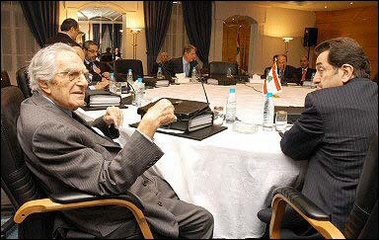 Lebanese MP Ghassan Tueini (L) speaks to MP Butrus Harb during the roundtable national dialogue at the parliament building in Beirut. Parties from across Lebanon‘s fractious political spectrum sat down for unprecedented talks in the hope finding unity in the face of rifts over Syrian influence in the country.(AFP/Pool/Hasan Ibrahim)
Lebanese MP Ghassan Tueini (L) speaks to MP Butrus Harb during the roundtable national dialogue at the parliament building in Beirut. Parties from across Lebanon‘s fractious political spectrum sat down for unprecedented talks in the hope finding unity in the face of rifts over Syrian influence in the country.(AFP/Pool/Hasan Ibrahim)
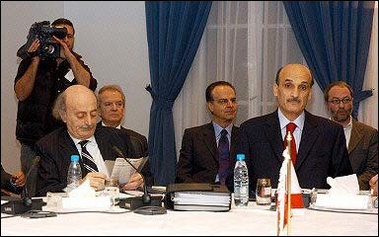 Lebanese Druze leader Walid Jumblatt (L) and Lebanese Forces leader Samir Geagea during a roundtable national dialogue at the parliament building in Beirut. Parties from across Lebanon‘s fractious political spectrum sat down for unprecedented talks in the hope finding unity in the face of rifts over Syrian influence in the country.(AFP/Pool/Hasan Ibrahim)
Lebanese Druze leader Walid Jumblatt (L) and Lebanese Forces leader Samir Geagea during a roundtable national dialogue at the parliament building in Beirut. Parties from across Lebanon‘s fractious political spectrum sat down for unprecedented talks in the hope finding unity in the face of rifts over Syrian influence in the country.(AFP/Pool/Hasan Ibrahim)
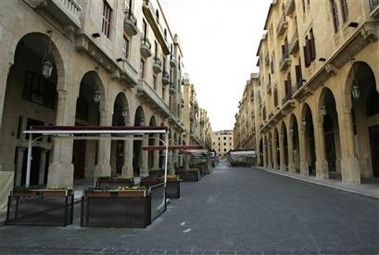 The downtown district of Beirut, where the parliament house is situated, is seen empty after restaurants, sidewalk cafes, banks and businesses were ordered to close ahead of the Lebanese leaders’ meeting aimed to tackle the country’s worst political crisis since the end of the 1975-90 civil war, in Beirut, Lebanon, Thursday, March 2, 2006. Lebanon‘s rival leaders sat down together in an unprecedented political dialogue Thursday aimed at resolving the country’s deep divisions since the end of Syrian domination, amid warnings that failure could worsen the slide toward instability. (AP Photo/Hussein Malla)
The downtown district of Beirut, where the parliament house is situated, is seen empty after restaurants, sidewalk cafes, banks and businesses were ordered to close ahead of the Lebanese leaders’ meeting aimed to tackle the country’s worst political crisis since the end of the 1975-90 civil war, in Beirut, Lebanon, Thursday, March 2, 2006. Lebanon‘s rival leaders sat down together in an unprecedented political dialogue Thursday aimed at resolving the country’s deep divisions since the end of Syrian domination, amid warnings that failure could worsen the slide toward instability. (AP Photo/Hussein Malla)
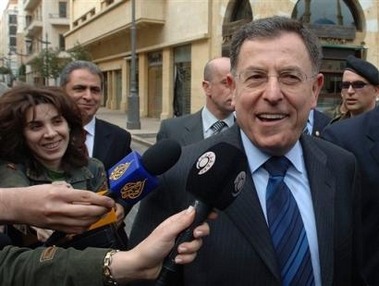 Lebanon‘s Prime Minister Fuad Saniora, right, speaks to the journalists as he leaves the parliament house after he attended the Lebanese leaders’ meeting aimed to tackle the country’s worst political crisis since the end of the 1975-90 civil war, in Beirut, Lebanon, Thursday, March 2, 2006. Lebanon‘s rival leaders sat down together in an unprecedented political dialogue Thursday aimed at resolving the country’s deep divisions since the end of Syrian domination, amid warnings that failure could worsen the slide toward instability. (AP Photo/Mahmoud Tawil)
Lebanon‘s Prime Minister Fuad Saniora, right, speaks to the journalists as he leaves the parliament house after he attended the Lebanese leaders’ meeting aimed to tackle the country’s worst political crisis since the end of the 1975-90 civil war, in Beirut, Lebanon, Thursday, March 2, 2006. Lebanon‘s rival leaders sat down together in an unprecedented political dialogue Thursday aimed at resolving the country’s deep divisions since the end of Syrian domination, amid warnings that failure could worsen the slide toward instability. (AP Photo/Mahmoud Tawil)
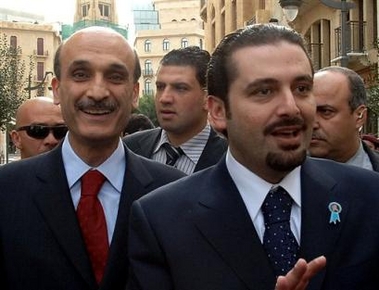 Lebanon‘s lawmaker Saad Hariri, right, son of slain former Prime Minister Rafik Hariri, and Samir Geagea, left, leader of the Christian Lebanese Forces, flanked by their bodyguards, react as they leave the parliament house after they attended the Lebanese leaders’ meeting aimed to tackle the country’s worst political crisis since the end of the 1975-90 civil war, in Beirut, Lebanon, Thursday, March 2, 2006. Lebanon‘s rival leaders sat down together in an unprecedented political dialogue Thursday aimed at resolving the country’s deep divisions since the end of Syrian domination, amid warnings that failure could worsen the slide toward instability. (AP Photo/ Mahmoud Tawil)
Lebanon‘s lawmaker Saad Hariri, right, son of slain former Prime Minister Rafik Hariri, and Samir Geagea, left, leader of the Christian Lebanese Forces, flanked by their bodyguards, react as they leave the parliament house after they attended the Lebanese leaders’ meeting aimed to tackle the country’s worst political crisis since the end of the 1975-90 civil war, in Beirut, Lebanon, Thursday, March 2, 2006. Lebanon‘s rival leaders sat down together in an unprecedented political dialogue Thursday aimed at resolving the country’s deep divisions since the end of Syrian domination, amid warnings that failure could worsen the slide toward instability. (AP Photo/ Mahmoud Tawil)
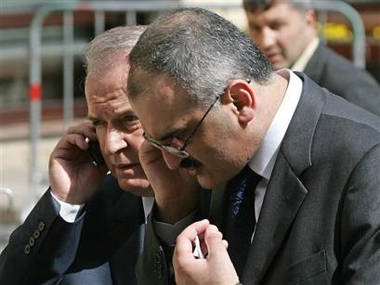 Ali Hassan Khalil, right, a Lebanese lawmaker of the Shiite Amal group, and Telecommunication Minister Marwan Hamadeh, left, speak on their mobile phones upon their arrival at the parliament house to attend the Lebanese leaders’ meeting in Beirut, Lebanon, Thursday, March 2, 2006. Lebanon‘s rival leaders sat down together in an unprecedented political dialogue Thursday aimed at resolving the country’s deep divisions since the end of Syrian domination, amid warnings that failure could worsen the slide toward instability. (AP Photo/Hussein Malla)
Ali Hassan Khalil, right, a Lebanese lawmaker of the Shiite Amal group, and Telecommunication Minister Marwan Hamadeh, left, speak on their mobile phones upon their arrival at the parliament house to attend the Lebanese leaders’ meeting in Beirut, Lebanon, Thursday, March 2, 2006. Lebanon‘s rival leaders sat down together in an unprecedented political dialogue Thursday aimed at resolving the country’s deep divisions since the end of Syrian domination, amid warnings that failure could worsen the slide toward instability. (AP Photo/Hussein Malla)
 Lebanese parliament majority leader Saad al-Hariri (R) prepares to enter parliament in downtown Beirut, Lebanon March 2, 2006. REUTERS/Sharif Karim
Lebanese parliament majority leader Saad al-Hariri (R) prepares to enter parliament in downtown Beirut, Lebanon March 2, 2006. REUTERS/Sharif Karim
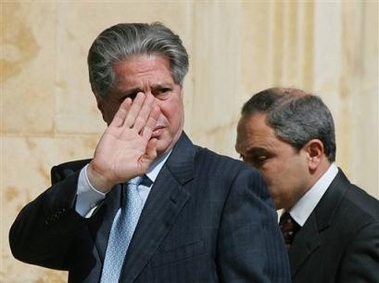 Lebanon‘s former President Amin Gemayel, left, waves upon his arrival at the parliament house to attend the Lebanese leaders’ meeting, in Beirut, Lebanon, Thursday, March 2, 2006. Lebanon‘s rival leaders sat down together in an unprecedented political dialogue Thursday aimed at resolving the country’s deep divisions since the end of Syrian domination, amid warnings that failure could worsen the slide toward instability. (AP Photo/Hussein Malla)
Lebanon‘s former President Amin Gemayel, left, waves upon his arrival at the parliament house to attend the Lebanese leaders’ meeting, in Beirut, Lebanon, Thursday, March 2, 2006. Lebanon‘s rival leaders sat down together in an unprecedented political dialogue Thursday aimed at resolving the country’s deep divisions since the end of Syrian domination, amid warnings that failure could worsen the slide toward instability. (AP Photo/Hussein Malla)
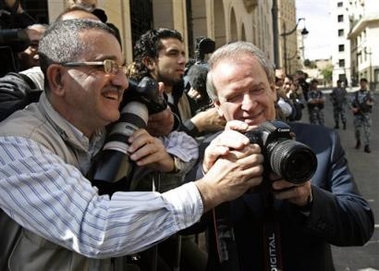 Lebanon‘s Telecommunications Minister Marwan Hamadeh, right, tries the camera of a photojournalist upon his arrival to the parliament house to attend the Lebanese leaders’ meeting in Beirut, Lebanon, Thursday, March 2, 2006. Lebanon‘s rival leaders sat down together in an unprecedented political dialogue Thursday aimed at resolving the country’s deep divisions since the end of Syrian domination, amid warnings that failure could worsen the slide toward instability. (AP Photo/Hussein Malla)
Lebanon‘s Telecommunications Minister Marwan Hamadeh, right, tries the camera of a photojournalist upon his arrival to the parliament house to attend the Lebanese leaders’ meeting in Beirut, Lebanon, Thursday, March 2, 2006. Lebanon‘s rival leaders sat down together in an unprecedented political dialogue Thursday aimed at resolving the country’s deep divisions since the end of Syrian domination, amid warnings that failure could worsen the slide toward instability. (AP Photo/Hussein Malla)
 Lebanon‘s legislator Saad Hariri, son of slain former Prime Minister Rafik Hariri, center, flanked by bodyguards, talks to a Lebanese army soldier, upon his arrival at the parliament house to attend the Lebanese leaders’ meeting in Beirut, Lebanon, Thursday, March 2, 2006. Lebanon‘s rival leaders opened a gathering Thursday aimed at resolving the deepening split between pro- and anti-Syrian factions, the country’s worst crisis since the end of its 1975-1990 civil war. The roundtable took place amid warnings that failure could worsen Lebanon‘s slide toward instability. (AP Photo/Hussein Malla)
Lebanon‘s legislator Saad Hariri, son of slain former Prime Minister Rafik Hariri, center, flanked by bodyguards, talks to a Lebanese army soldier, upon his arrival at the parliament house to attend the Lebanese leaders’ meeting in Beirut, Lebanon, Thursday, March 2, 2006. Lebanon‘s rival leaders opened a gathering Thursday aimed at resolving the deepening split between pro- and anti-Syrian factions, the country’s worst crisis since the end of its 1975-1990 civil war. The roundtable took place amid warnings that failure could worsen Lebanon‘s slide toward instability. (AP Photo/Hussein Malla)
 Lebanese anti-Syrian Druse leader Walid Jumblatt, right, flanked by his bodyguard, arrives to the parliament house to attend a meeting in Beirut, Lebanon, Thursday, March 2, 2006. Lebanon‘s rival leaders sat down together in an unprecedented political dialogue Thursday aimed at resolving the country’s deep divisions since the end of Syrian domination, amid warnings that failure could worsen the slide toward instability. (AP Photo/Hussein Malla)
Lebanese anti-Syrian Druse leader Walid Jumblatt, right, flanked by his bodyguard, arrives to the parliament house to attend a meeting in Beirut, Lebanon, Thursday, March 2, 2006. Lebanon‘s rival leaders sat down together in an unprecedented political dialogue Thursday aimed at resolving the country’s deep divisions since the end of Syrian domination, amid warnings that failure could worsen the slide toward instability. (AP Photo/Hussein Malla)
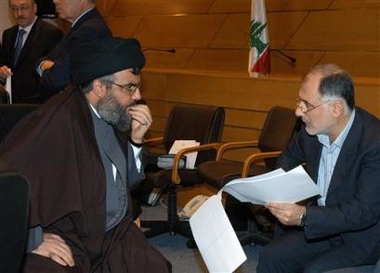 Hezbollah leader Sheik Hasan Nasrallah, left, talks to Hezbollah lawmaker Mohammed Fneish, right, ahead of the Lebanese leaders’ meeting, in the parliament house, in Beirut, Lebanon, Thursday, March 2, 2006. Lebanon‘s rival leaders opened a gathering Thursday aimed at resolving the deepening split between pro- and anti-Syrian factions, the country’s worst crisis since the end of its 1975-1990 civil war. The roundtable took place amid warnings that failure could worsen Lebanon‘s slide toward instability. (AP Photo/Hasan Ibrahim, Pool)
Hezbollah leader Sheik Hasan Nasrallah, left, talks to Hezbollah lawmaker Mohammed Fneish, right, ahead of the Lebanese leaders’ meeting, in the parliament house, in Beirut, Lebanon, Thursday, March 2, 2006. Lebanon‘s rival leaders opened a gathering Thursday aimed at resolving the deepening split between pro- and anti-Syrian factions, the country’s worst crisis since the end of its 1975-1990 civil war. The roundtable took place amid warnings that failure could worsen Lebanon‘s slide toward instability. (AP Photo/Hasan Ibrahim, Pool)
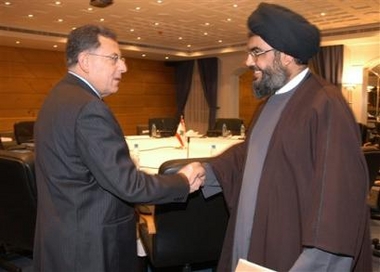 Hezbollah leader Sheik Hasan Nasrallah, right, shakes hands with Lebanon‘s Prime Minister Fuad Saniora, left, ahead of their meeting in the parliament house, in Beirut, Lebanon, Thursday, March 2, 2006. Lebanon‘s rival leaders opened a gathering Thursday aimed at resolving the deepening split between pro- and anti-Syrian factions, the country’s worst crisis since the end of its 1975-1990 civil war. The roundtable took place amid warnings that failure could worsen Lebanon‘s slide toward instability. (AP Photo/Hasan Ibrahim, Pool)
Hezbollah leader Sheik Hasan Nasrallah, right, shakes hands with Lebanon‘s Prime Minister Fuad Saniora, left, ahead of their meeting in the parliament house, in Beirut, Lebanon, Thursday, March 2, 2006. Lebanon‘s rival leaders opened a gathering Thursday aimed at resolving the deepening split between pro- and anti-Syrian factions, the country’s worst crisis since the end of its 1975-1990 civil war. The roundtable took place amid warnings that failure could worsen Lebanon‘s slide toward instability. (AP Photo/Hasan Ibrahim, Pool)
 Hezbollah leader Sheik Hasan Nasrallah, right, shakes hands with Lebanese anti-Syrian Druse leader Walid Jumblatt, left, ahead of their meeting in the parliament house, in Beirut, Lebanon, Thursday, March 2, 2006. Lebanon‘s rival leaders opened a gathering Thursday aimed at resolving the deepening split between pro- and anti-Syrian factions, the country’s worst crisis since the end of its 1975-1990 civil war. The roundtable took place amid warnings that failure could worsen Lebanon‘s slide toward instability. (AP Photo/ Hasan Ibrahim, Pool)
Hezbollah leader Sheik Hasan Nasrallah, right, shakes hands with Lebanese anti-Syrian Druse leader Walid Jumblatt, left, ahead of their meeting in the parliament house, in Beirut, Lebanon, Thursday, March 2, 2006. Lebanon‘s rival leaders opened a gathering Thursday aimed at resolving the deepening split between pro- and anti-Syrian factions, the country’s worst crisis since the end of its 1975-1990 civil war. The roundtable took place amid warnings that failure could worsen Lebanon‘s slide toward instability. (AP Photo/ Hasan Ibrahim, Pool)
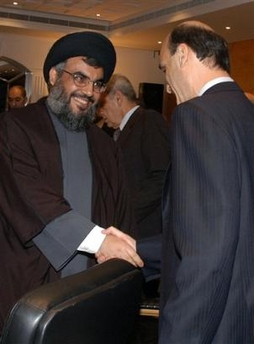 Hezbollah leader Sheik Hasan Nasrallah, left, shakes hands with the leader of the Christian Lebanese Forces Samir Geagea, right, ahead of the Lebanese leaders’ meeting in the parliament house, Beirut, Lebanon, Thursday, March 2, 2006. Lebanon‘s rival leaders opened a gathering Thursday aimed at resolving the deepening split between pro- and anti-Syrian factions, the country’s worst crisis since the end of its 1975-1990 civil war. The roundtable took place amid warnings that failure could worsen Lebanon‘s slide toward instability. (AP Photo/Hasan Ibrahim, Pool)
Hezbollah leader Sheik Hasan Nasrallah, left, shakes hands with the leader of the Christian Lebanese Forces Samir Geagea, right, ahead of the Lebanese leaders’ meeting in the parliament house, Beirut, Lebanon, Thursday, March 2, 2006. Lebanon‘s rival leaders opened a gathering Thursday aimed at resolving the deepening split between pro- and anti-Syrian factions, the country’s worst crisis since the end of its 1975-1990 civil war. The roundtable took place amid warnings that failure could worsen Lebanon‘s slide toward instability. (AP Photo/Hasan Ibrahim, Pool)
 Lebanon‘s leaders sit around a table, with their aids and representatives behind them, during a meeting in the parliament house, Beirut, Lebanon, Thursday, March 2, 2006. Lebanon‘s rival leaders opened a gathering Thursday aimed at resolving the deepening split between pro- and anti-Syrian factions, the country’s worst crisis since the end of its 1975-1990 civil war. The roundtable took place amid warnings that failure could worsen Lebanon‘s slide toward instability. (AP Photo/Hasan Ibrahim, Pool)
Lebanon‘s leaders sit around a table, with their aids and representatives behind them, during a meeting in the parliament house, Beirut, Lebanon, Thursday, March 2, 2006. Lebanon‘s rival leaders opened a gathering Thursday aimed at resolving the deepening split between pro- and anti-Syrian factions, the country’s worst crisis since the end of its 1975-1990 civil war. The roundtable took place amid warnings that failure could worsen Lebanon‘s slide toward instability. (AP Photo/Hasan Ibrahim, Pool)
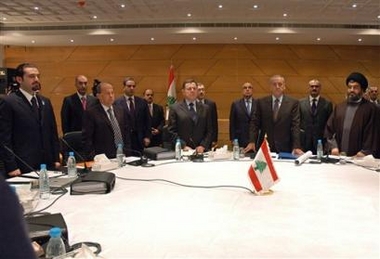 Lebanon‘s leaders, from left to right, legislator Saad Hariri, son of slain former Prime Minister Rafik Hariri, General legislator Michel Aoun, Prime Minister Fuad Saniora, Parliament Speaker Nabih Berri and Hezbollah leader Sheik Hasan Nasrallah, stand along with their aids and other representatives, behind, for the national anthem ahead of their meeting in the parliament house, Beirut, Lebanon, Thursday, March 2, 2006. Lebanon‘s rival leaders opened a gathering Thursday aimed at resolving the deepening split between pro- and anti-Syrian factions, the country’s worst crisis since the end of its 1975-1990 civil war. The roundtable took place amid warnings that failure could worsen Lebanon‘s slide toward instability. (AP Photo/Hasan Ibrahim, Pool)
Lebanon‘s leaders, from left to right, legislator Saad Hariri, son of slain former Prime Minister Rafik Hariri, General legislator Michel Aoun, Prime Minister Fuad Saniora, Parliament Speaker Nabih Berri and Hezbollah leader Sheik Hasan Nasrallah, stand along with their aids and other representatives, behind, for the national anthem ahead of their meeting in the parliament house, Beirut, Lebanon, Thursday, March 2, 2006. Lebanon‘s rival leaders opened a gathering Thursday aimed at resolving the deepening split between pro- and anti-Syrian factions, the country’s worst crisis since the end of its 1975-1990 civil war. The roundtable took place amid warnings that failure could worsen Lebanon‘s slide toward instability. (AP Photo/Hasan Ibrahim, Pool)
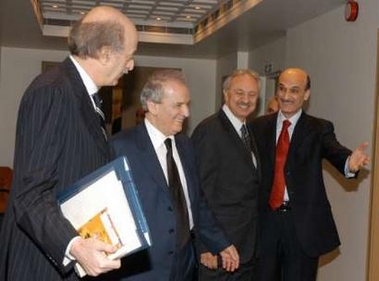 (L-R) Lebanese Druze leader Walid Jumblatt , Telecommunications Minister Marwan Hamadeh, Head of the Lebanese deputies of northern Lebanon Mohamed Safadi and Christian leader Samir Geagea react while on their way to the first political leader talks held in the parliament in downtown Beirut, Lebanon March 2, 2006. REUTERS/Hassan Ibrahim/Pool
(L-R) Lebanese Druze leader Walid Jumblatt , Telecommunications Minister Marwan Hamadeh, Head of the Lebanese deputies of northern Lebanon Mohamed Safadi and Christian leader Samir Geagea react while on their way to the first political leader talks held in the parliament in downtown Beirut, Lebanon March 2, 2006. REUTERS/Hassan Ibrahim/Pool
 Lebanon‘s leaders, from left to right, legislator Saad Hariri, son of slain former Prime Minister Rafik Hariri, Prime Minister Fuad Saniora, Parliament Speaker Nabih Berri and Hezbollah leader Sheik Hasan Nasrallah, sit around the table, with their aids and representatives behind them, during their meeting, in the parliament house, Beirut, Lebanon, Thursday, March 2, 2006. Lebanon‘s rival leaders opened a gathering Thursday aimed at resolving the deepening split between pro- and anti-Syrian factions, the country’s worst crisis since the end of its 1975-1990 civil war. The roundtable took place amid warnings that failure could worsen Lebanon‘s slide toward instability. (AP Photo/Hasan Ibrahim, Pool)
Lebanon‘s leaders, from left to right, legislator Saad Hariri, son of slain former Prime Minister Rafik Hariri, Prime Minister Fuad Saniora, Parliament Speaker Nabih Berri and Hezbollah leader Sheik Hasan Nasrallah, sit around the table, with their aids and representatives behind them, during their meeting, in the parliament house, Beirut, Lebanon, Thursday, March 2, 2006. Lebanon‘s rival leaders opened a gathering Thursday aimed at resolving the deepening split between pro- and anti-Syrian factions, the country’s worst crisis since the end of its 1975-1990 civil war. The roundtable took place amid warnings that failure could worsen Lebanon‘s slide toward instability. (AP Photo/Hasan Ibrahim, Pool)
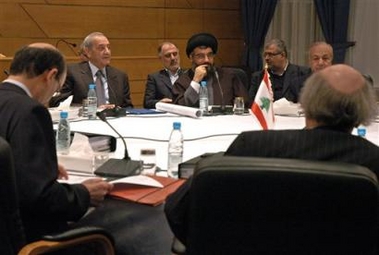 Lebanon‘s leaders and aides, from left, leader of the Christian Lebanese Forces Samir Geagea, seen from rear, Parliament Speaker Nabih Berri, Hezbollah lawmaker Mohammed Fneish, Hezbollah leader Sheik Hassan Nasrallah, Hezbollah lawmaker Mohammed Raad, Eastern Orthodox Christian lawmaker Michel Murr, and anti-Syrian Druse leader Walid Jumblatt, seen from back, sit around a table during a meeting in the parliament house, Beirut, Lebanon, Thursday, March 2, 2006. Lebanon‘s rival leaders opened a gathering Thursday aimed at resolving the deepening split between pro- and anti-Syrian factions, the country’s worst crisis since the end of its 1975-1990 civil war. The roundtable took place amid warnings that failure could worsen Lebanon‘s slide toward instability. (AP Photo/Hasan Ibrahim, Pool)
Lebanon‘s leaders and aides, from left, leader of the Christian Lebanese Forces Samir Geagea, seen from rear, Parliament Speaker Nabih Berri, Hezbollah lawmaker Mohammed Fneish, Hezbollah leader Sheik Hassan Nasrallah, Hezbollah lawmaker Mohammed Raad, Eastern Orthodox Christian lawmaker Michel Murr, and anti-Syrian Druse leader Walid Jumblatt, seen from back, sit around a table during a meeting in the parliament house, Beirut, Lebanon, Thursday, March 2, 2006. Lebanon‘s rival leaders opened a gathering Thursday aimed at resolving the deepening split between pro- and anti-Syrian factions, the country’s worst crisis since the end of its 1975-1990 civil war. The roundtable took place amid warnings that failure could worsen Lebanon‘s slide toward instability. (AP Photo/Hasan Ibrahim, Pool)
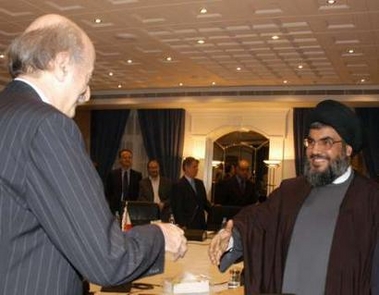 Lebanese Hizbollah leader Sayyed Hassan Nasrallah (R) shakes hands with Druze leader Walid Jumblatt during their meeting held in parliament in downtown Beirut, Lebanon March 2, 2006. REUTERS/Hassan Ibrahim/Pool
Lebanese Hizbollah leader Sayyed Hassan Nasrallah (R) shakes hands with Druze leader Walid Jumblatt during their meeting held in parliament in downtown Beirut, Lebanon March 2, 2006. REUTERS/Hassan Ibrahim/Pool
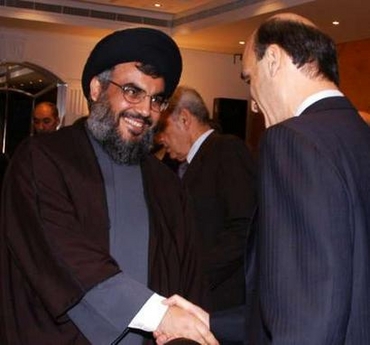 Lebanese Hizbollah leader Sayyed Hassan Nasrallah (L) shakes hands with Christian Lebanese Forces leader Samir Geagea during their first meeting held in parliament in downtown Beirut, Lebanon March 2, 2006. REUTERS/Hassan Ibrahim/Pool
Lebanese Hizbollah leader Sayyed Hassan Nasrallah (L) shakes hands with Christian Lebanese Forces leader Samir Geagea during their first meeting held in parliament in downtown Beirut, Lebanon March 2, 2006. REUTERS/Hassan Ibrahim/Pool
 Sayyed Hassan Nasrallah (R), Leader of the Lebanon‘s Hizbollah resistance, Parliament speaker Nabih Berri (2nd R), Prime Minister Fouad Siniora (C), General Michel Aoun (2nd L) and Lebanese parliament majority Sunni leader Saad al-Hariri (L) hold their first talks in parliament in downtown Beirut, Lebanon March 2, 2006. REUTERS/Hassan Ibrahim/Pool
Sayyed Hassan Nasrallah (R), Leader of the Lebanon‘s Hizbollah resistance, Parliament speaker Nabih Berri (2nd R), Prime Minister Fouad Siniora (C), General Michel Aoun (2nd L) and Lebanese parliament majority Sunni leader Saad al-Hariri (L) hold their first talks in parliament in downtown Beirut, Lebanon March 2, 2006. REUTERS/Hassan Ibrahim/Pool
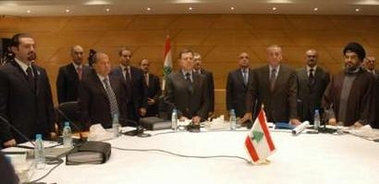
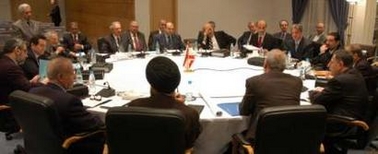 Lebanese political leaders hold their first talks in parliament in downtown Beirut, Lebanon March 2, 2006. REUTERS/Hassan Ibrahim/Pool
Lebanese political leaders hold their first talks in parliament in downtown Beirut, Lebanon March 2, 2006. REUTERS/Hassan Ibrahim/Pool
But Parliament Speaker Nabih Berri, who is convening the talks, described the first session, which focused on a U.N. inquiry into the murder of former Prime Minister Rafik al-Hariri a year ago, as "positive despite the variety of views".
The investigation has already implicated senior Syrian officials and their Lebanese allies, including four generals, in the murder, though all deny involvement.
SYRIAN TUTELAGE
Hariri’s assassination in a one-ton truck bomb sparked massive street protests that forced Syria to withdraw its forces from its smaller neighbor after 29 years and an anti-Syrian coalition to sweep to victory in elections last year.
Those changes were hailed at the time as heralding the end of Syrian tutelage, but Damascus’ local allies remain and so do political splits that have often prevented the government from meeting or taking decisions over the past year and have blocked much-need economic reforms.
Most Lebanese leaders — Muslim and Christian, pro- and anti-Syrian — were at the meeting, making it the highest-level gathering since a gathering in the Saudi city of Taif that ended the civil war.
"The dialogue lays the foundation for a new period because we are moving from a period of occupation and hegemony to one of independence and it is necessary to agree on the next period," former president Amin Gemayel told reporters after the first session, which took place behind closed doors.
Diplomats and analysts say the leaders may soothe tensions, but are unlikely to resolve the complex issues behind them.
Disputes had already surfaced before the meeting, with members of the anti-Syrian coalition objecting to officials from three pro-Syrian parties attending to begin with.
Hizbollah, has repeatedly said it will not disarm, but will use its guns only against Israel.
Lebanese security forces deployed heavily around the parliament building in central Beirut, blocking traffic and searching pedestrians. Shops and offices downtown were also shut, bringing life in the usually busy area to a halt.



